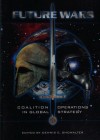Future Wars: Coalition Operations in Global Strategy
Written by: Dennis E. Showalter (ed.),
Imprint Publications, Chicago, 2002,
ISBN: 9781879176393, 184pp.
Reviewed by: Major Russell Parkin, Australian Defence College, Weston Creek
Previous volumes of the United States Air Force Academy’s Military History Symposium Series have produced some excellent studies. Volume 7 in the series contains a collection of essays on the subject of coalition warfare that very successfully fulfil Sir Michael Howard’s injunction that military history be studied in breadth, depth and context. The breadth is provided by the chronological scope of the essays, which span the classical period to the 1991 Gulf War, while the scholarship evident in the individual contributions provides the necessary depth of study. The prologue written by editor Dennis Showalter (with William J. Astore) and Showalter’s epilogue provide the context for the collection. The essays are presented in chronological sequence, forming a brief history of alliance and coalition warfare that has considerable contemporary significance.
The subject matter of the individual essays ranges widely through history to cover politico-military, operational and cross-cultural aspects of coalition warfare. While most of the collection deals with coalitions from the 19th century onwards, Alfred S. Bradford’s essay on asymmetrical coalitions in Greek and Roman times is a reminder that, for most of the history of warfare, coalitions have been the norm rather than the exception. The essay also suggests that the models provided by ancient asymmetrical coalitions have some bearing on those found in the modern world. Donald D. Horward’s essay on the often faltering European coalition against Napoleon underlines the importance of national self-interest in determining the fate of coalitions. The point is reinforced by an excellent essay from Andrew Lambert writing on the Crimean War, and Holger H. Herwig and Keith Neilson writing respectively on the Austro-Hungarian and Anglo-Russian alliances in World War I. Essays on the Anglo-American special relationship by Warren F. Kimball and Marc Trachtenberg’s discussion of relations between the United States and Europe during the first decade of NATO resonate strongly with recent events, as does Thomas A. Keaney’s study of US involvement in the 1991 Gulf War. Addressing a specifically operational issue, Adrian R. Lewis considers the negative influence of the compromise between the United States and Britain over amphibious doctrine and how this shaped the planning and conduct of the Normandy invasion in 1944. Xiaoming Zhang’s essay on Chinese and Russian involvement in the Korean War draws parallels between the early 1950s and issues confronting contemporary US–China relations. Carl Boyd’s essay on Nazi Germany’s hollow alliance with Imperial Japan presents an instance of how two nations divided by interests, geography and culture failed to cooperate effectively.
Although it is principally a work of military history, this collection will be of interest to scholars from a variety of fields because the insights it provides span the disciplines of military history, political science and international relations. This volume is a most useful study of an area with substantial relevance in the current international defence and security environment. In particular, the topic of coalition warfare is of special relevance to Australia and the Australian Defence Force.


